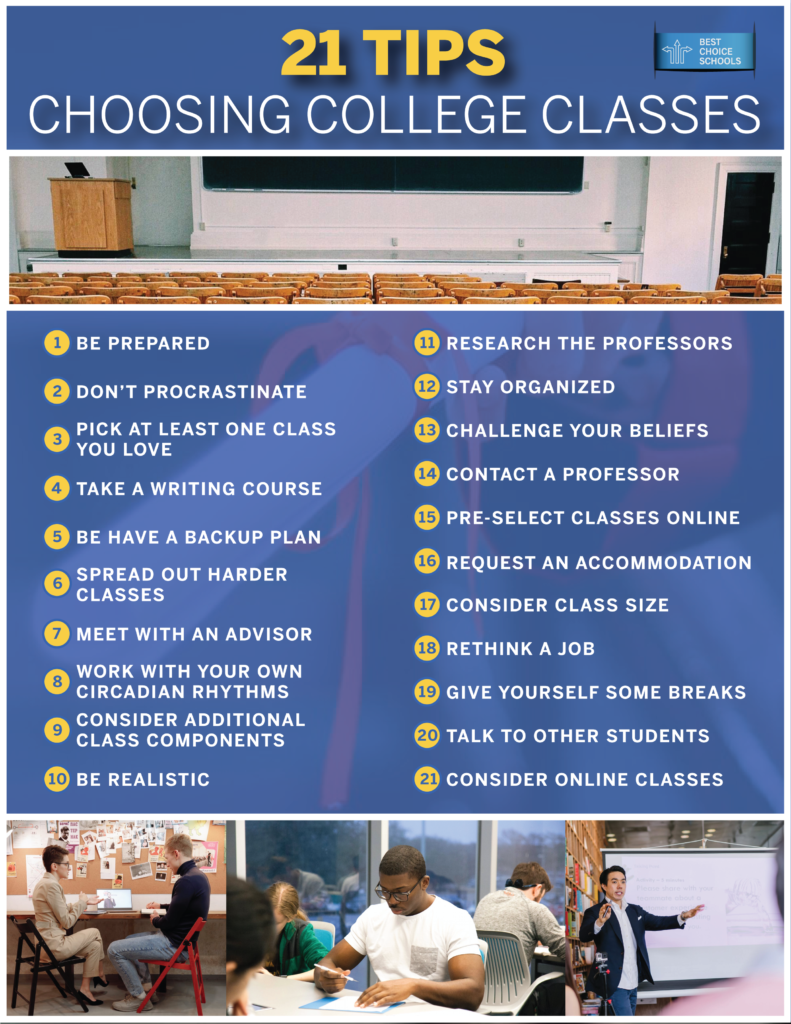
Whether you’re an incoming freshman or returning student, choosing the right classes can have a significant impact on how well your semester goes. With hundreds—perhaps thousands of options, making the right choices can be mind-bending. And unlike high school, you’ll be creating your own schedule. It’s enough to bring even the most organized scholar to her knees.
In this article, we’ll talk about the most important things to consider when choosing college classes. There’s a lot to think about, and although the task might seem overwhelming, remember these decisions won’t alter your destiny forever, just a few weeks of your life.
So take a deep breath, grab a snack, and read through our suggestions for pulling it all together.
Prepare Ahead by Knowing What’s Required

The first step in choosing your classes is to know precisely what you need. There’s no point in making decisions when you don’t have all the facts. Your options at this point will probably differ depending on whether you know your major or not.
If You Don’t Know Your Major:
It’s really okay not to pick a major right away. If you’re enrolled in a general studies program, you’ll have a list of core course requirements like English, literature, math, algebra, science, foreign languages, etc. Don’t forget that your SAT subject tests, AP tests, and IB tests may get you out of some of the requirements.
If You Do Know Your Major:
If you have declared your major, then you should plan more specifically. You should account for your general requirements, but also for your major requirements as well. While it can be hard to think so far ahead, creating a four-year plan is a good idea at this point.
Don’t Procrastinate—Register Early
If you want the best chances of getting the classes you want, register as early as possible. Glitches do happen, and trying to resolve problems at the last minute is stressful and unnecessary. The earlier you register, the more time you will have to develop a backup plan if you don’t already have one.
Schedule at Least One Class That Interests You
It’s hard to get out of bed if every class on your schedule is dry, tedious, or difficult. You need to include at least one elective course that captivates, engages, and holds your interest. Think of it as a reward for enduring the more challenging classes. This is true whether you have declared a major or not.
The course can relate to your discipline, but it doesn’t need to be. It can be an entirely unrelated subject of interest. The point is that it needs to be fun and allow you to learn from a new perspective.
Take a Writing Course

Even if it’s not a requirement, a college English composition course will benefit you in all the other academic (and career) work you pursue. While you might already consider yourself a good writer, writing at the college level is far different than in high-school. In many of your courses, academic writing will be expected, so if you want to be successful throughout your college career, this is a must. Communication and writing skills are critical skills throughout life and investing in these types of courses during college is critical, not only to future college success, but also once you enter the workplace.
Have a Backup Plan
During registration periods, classes can fill up quickly. As a freshman, you may not have first priority when choosing college courses, and your top choice may be filled. You’ll want to have a backup class or two in mind. Talk with your advisor if you need help choosing a backup.
Spread Out Your Most Difficult Classes
You will want to get your general education requirements out of the way as soon as you can, since major-specific courses tend to increase in difficulty as time goes on. Try to tackle your most challenging subjects first; that way, you won’t be cramming too many 400-level classes at once. But don’t pile it on either. Spread them out, so you don’t become overwhelmed.
Meet With Your Academic Advisor as Early as Possible
While sketching out the framework for your college class schedule, don’t forget to make an appointment with an adviser. No matter what year you’re in, your academic advisor will be your lifeline and can save you a great deal of time and frustration. Advisors are often an untapped resource, but they have a lot of expertise and can help you develop a solid plan.
Schedule Your Classes During Your Most Energetic Time

If you are a morning person, you’ll want early classes because that’s when you will naturally be refreshed, awake, and alert. But for night owls, early morning classes are probably not realistic. Scheduling your studies for a time of day when you feel your best ensures you are working with your natural rhythms, not against them.
A word of caution, though—don’t schedule your classes too late, or you might lose motivation and be tempted to slack off.
Watch for Any Extra Components of a Class
Some classes have extra components or out-of-class requirements. Don’t forget to check on these details before signing. Does your class have a lab component? Make sure you know when and where the lab is held, so you don’t schedule another class during that time. Also, check for service-learning projects or residency requirements before enrolling in the class.
Be Realistic About What You Can Handle
If you don’t enjoy doing homework or studying and aren’t accustomed to doing a lot of classwork and reading, you do not want to register for 18 credit hours in your freshman year. Instead, ease yourself into an academic schedule that works for you. Don’t bite off more than you can chew in your first semester, because if you struggle, it can be challenging to maintain motivation to continue next year.
Research the Professors
If delivery is as essential to you as a course’s content, consider researching the professors before you choose a course. Some instructors are just naturally more engaging than others. Many schools will have ratings from previous evaluations available for you to view, but some will not. You can always check out sites like ratemyprofessors.com. They have an extensive list of reviews from students who have attended schools all over the country.
Stay Organized

There are probably a lot more activities on your calendar in college than you’ve ever had before. Between courses, clubs, volunteering, and outside activities, you’re bound to start forgetting things when you get busy. Depending on your personal style, you’re going to need a system to keep all your activities organized.
Whether it’s a physical calendar or planner, or a digital tool, make sure you record your college schedule and refer back to the list often. Once you get into a routine, staying organized will become second-nature, and you’ll wonder how you ever got along without writing everything down.
Get Out of Your Comfort Zone
Some experts recommend that students take a class at least once a year that opposes their worldviews. Atheists should try theology, and conservatives should try a course on liberal thoughts, etc. Whatever it is, it should be something that challenges your beliefs. You’ll learn more than you expected, and it will broaden your thinking.
Reach Out To a Professor
If there’s a waitlist for a class you desperately want to take, it never hurts to email the professor. If you can convey your enthusiasm for the class and how disappointed you will be to miss it, they just might find a way to squeeze you in.
Pre-Select Classes Online
Some schools offer the opportunity to pre-select classes online, and then just click “register” when it’s time. This little bit of extra prep work might mean all the difference in getting the classes you really want.
Request an Accommodation
If your major is highly specialized, you’re a transfer student, or you are an athlete, you may be able to get a better registration time by merely requesting it. Most schools will make accommodations for students in special circumstances, but you have to speak up!
Consider the Size of the Class

Depending on your style of learning, class size may be a factor when choosing your classes. If sitting in a lecture hall with 200 other students sounds like a nightmare to you, consider picking courses with a smaller student to professor ratio. Some students aren’t cut out for crowds and do their best learning in a more interactive classroom.
Rethink Your Job
If you have part-time employment, your free time and weekends might be consumed with your job, leaving no time for anything but school and work. This may be okay for some students, but it can lead to exhaustion and burnout in others.
If you can get away with it, consider ditching the job and just focusing on your classes. This will give you more time to study and free up some time for relaxing activities. Ultimately, your college years should be enjoyable and fun. If money is an issue, consider some freelance gigs where you control your own schedule.
Give Yourself Some Breaks
It may seem like scheduling all your classes during one or two days a week is a good idea, but you may soon dread getting up in the morning on particularly demanding days. Consider, too, that if you schedule all your classes for one day, you’ll encounter the nightmare of final exams in one day as well.
Talk To Experienced Students
Some of the best advice you can find will come from students who are ahead of you in college. They’ve already undergone the whole registration process and can give you tips you may not have thought of yet. They can also be a big help when it comes to learning what professors to avoid, the most exciting classes to take, or the best organizations to join.
Consider Online Classes

With the coronavirus pandemic changing how many schools deliver classes, this final tip may be more relevant than ever. If you enroll in online courses, there are a few additional tips to consider to make sure everything goes smoothly:
Be Accountable
Treat your online classes just like any in-person class you would take. Show up on time, actively participate, and complete all assignments on time. Consider pairing up with another student so you can keep each other on track.
Manage Your Time
With online classes, you will need to manage your schedule better than ever. The lack of structure can be detrimental to students prone to procrastination or who don’t have solid time management skills. It can be easy to leave things until the last minute only to find that you have multiple hours of work to catch up on.
Create a Dedicated Study Space
This is true with all coursework, but with online courses, it can be even more critical to create a space conducive to study. In many cases, you will be required to attend live classes and lectures, and you will want a dedicated space to participate without a lot of noise or distractions.

Final Thoughts
With these 20 tips on choosing college classes in mind, look over the sample class schedule offerings. Then, make up several possible schedules that could work for you during the semester. Play around with the days and times, making sure you have plenty of time to get from one class to another.
Don’t be afraid of choosing the wrong classes or not getting into the classes of your choice right away. College is meant to be a time for exploration, and there’s really no such thing as making a mistake when it comes to choosing classes. Instead, you are learning about what you prefer, which is a self-discovery process you should strive to maintain throughout your life.
Remember that you will need at least three hours of study time each week for every class you take. With a little planning and forethought, incoming freshmen will have the perfect first semester of college, and returning students can create their best one yet.
Related:
- 10 Tips for Choosing the Best College
- 10 Tips for Choosing the Best College Major
- How Do I Know if a Degree is a Good Fit for Me?
- How Do I Know if a Degree is a Good Fit for Me?
- Tips for Choosing a College Minor
- What Should I Look for When Searching a College Website?
- Who Teaches College Freshman Courses?